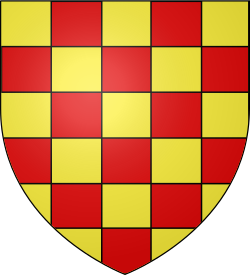Robert II de Vaux of Gilisland facts for kids
Quick facts for kids
Robert II de Vaux
|
|
|---|---|
| Baron of Gilsland | |

Vaux of Gilsland arms: Chequy or and gules.
|
|
| Died | 1235 |
| Noble family | de Vaux |
Robert II de Vaux (died 1235) was an important English noble. He held the title of Baron of Gilsland. This meant he was a powerful landowner in the Gilsland area of England.
Robert was part of the well-known de Vaux family. He lived during a time when kings and nobles often had disagreements. His life involved serving the king and sometimes challenging royal power.
Contents
Early Life and Family
Robert II de Vaux was the oldest son of Ranulf de Vaux and his wife, Alicia. When his father passed away in 1199, Robert took over his father's lands and titles. This made him the new Baron of Gilsland.
Robert married a woman named Johanna. Not much is known about her family. Together, they continued the de Vaux family line.
Robert's Role with King John
Robert lived during the reign of King John of England. This was a difficult time for many nobles. In 1212, Robert faced financial challenges. To guarantee money he owed the King, Robert had to offer his mother, sister, and half-brother Roland as a promise. This was a common practice back then to ensure debts were paid.
Later, in 1215, King John appointed Robert as the governor of Carlisle Castle. This was a very important job, as Carlisle Castle was a key fortress. It protected the border between England and Scotland.
Joining the Barons' Rebellion
Despite his appointment, Robert soon joined other powerful nobles. These barons decided to stand up against King John. They were unhappy with the King's rule and his policies. This period led to major conflicts in England.
Robert's decision to join the barons showed his willingness to challenge royal authority. This was a significant moment in his life.
Later Years and Legacy
After King John's reign, Robert continued to be a noble under King Henry III of England. Robert was sometimes required to pay a special tax called "scutage." This tax was paid instead of serving in the King's military campaigns. It allowed nobles to avoid fighting in wars.
Robert II de Vaux passed away in 1235. His son, Hubert, then inherited his titles and lands. Robert's life shows the complex roles of nobles in medieval England. They were both servants of the king and powerful figures in their own right.

